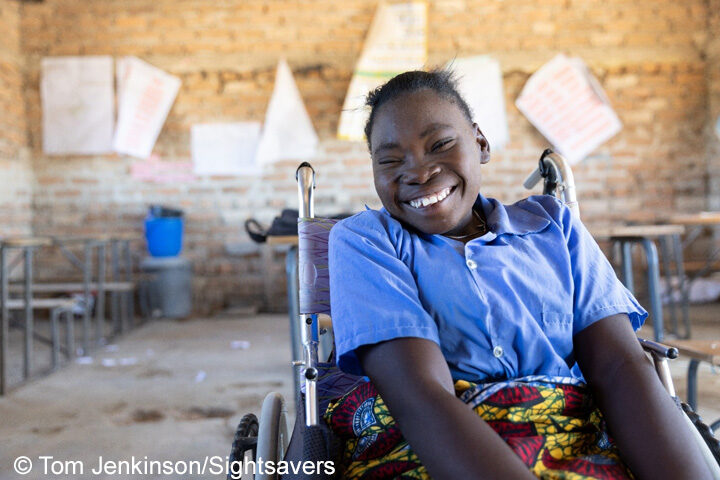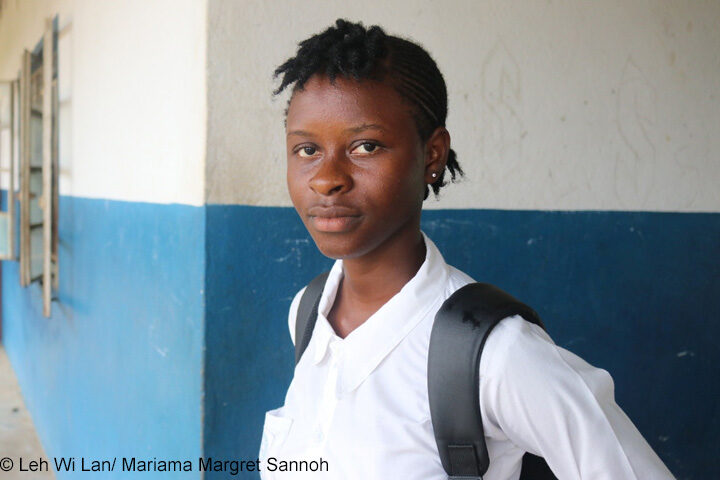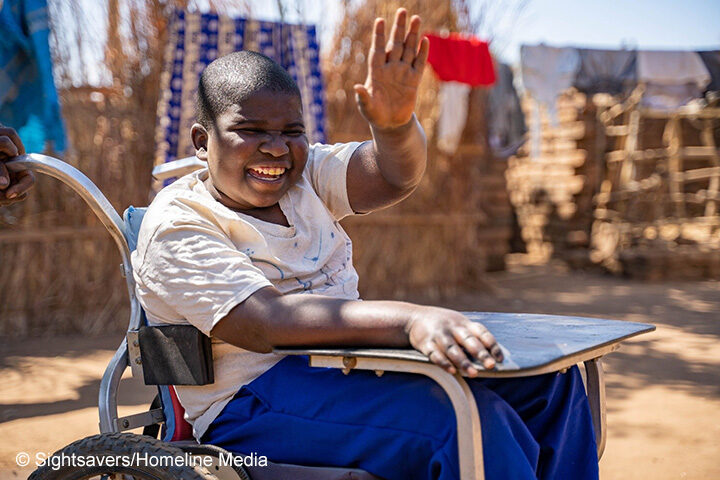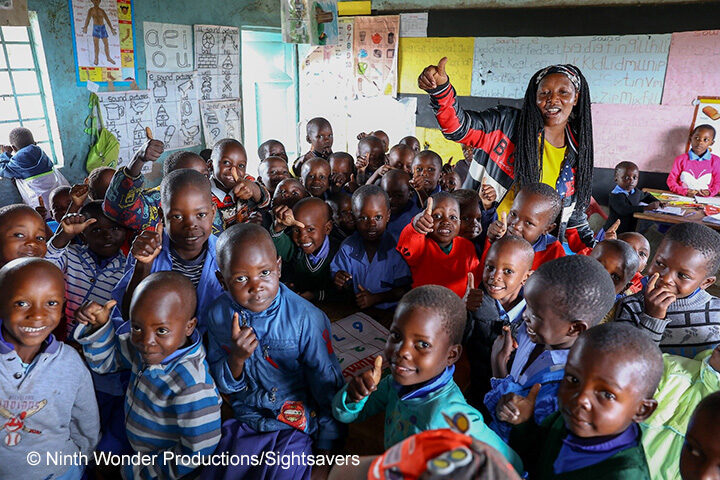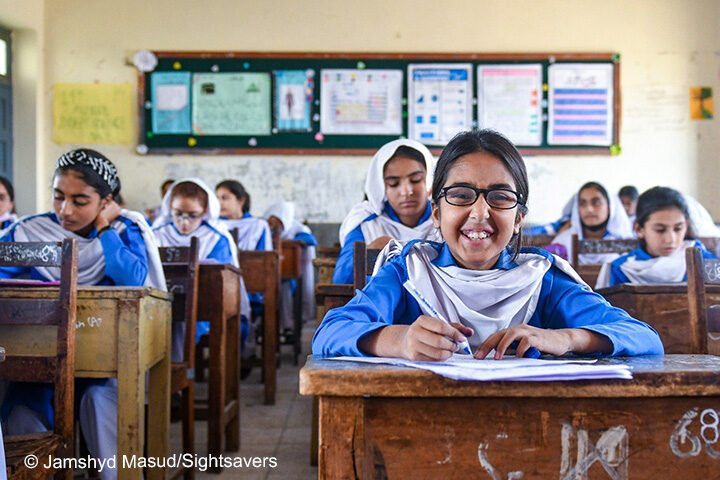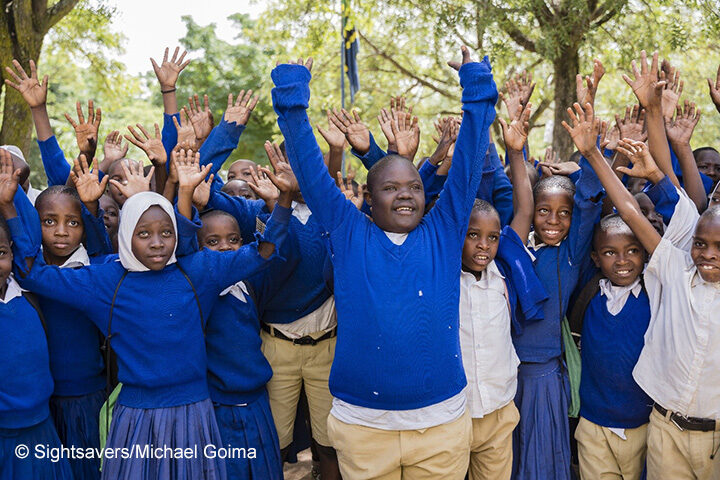Sightsavers is an international development organisation working in more than 30 countries to protect sight and promote disability rights. We have 24 education programmes across 12 countries, championing every child’s right to an inclusive, quality education.
Currently, the education sector is making inadequate progress towards Goal 4 (quality education) of the UN Sustainable Development Goals (SDGs). But our programmes and in-house research show that transformative change is possible when education systems are inclusive.
Our work helps address the inequality faced by the world’s 240 million children with disabilities, who in many countries are more than twice as likely to be out of school as their peers without disabilities. By prioritising inclusive education, we can help get SDG4 back on track and support all children to reach their potential.
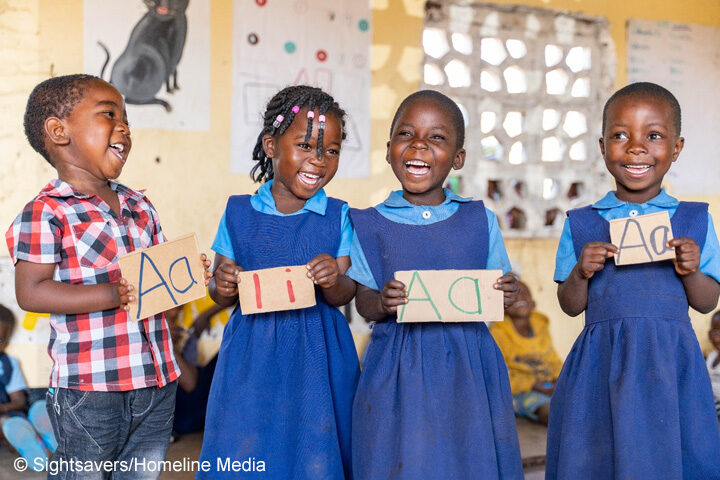
Peace, Charity, Grace and Loveness showing letter cards they had picked in their classroom in Ntcheu District, Malawi.
At Sightsavers, we have a varied inclusive education portfolio, ranging from early childhood education to tertiary education. Our approach is to support and strengthen existing education and governance systems rather than developing parallel approaches. We work at the institutional level by supporting the development of regulatory frameworks, policies and guidelines, and at the organisational level by supporting government and non-government actors who are responsible for education service delivery.
We also support schools and communities by collaborating with education providers, families and community members. We liaise with organisations of persons with disabilities (OPDs) to ensure that the projects we support meet both national and local needs.
Newsflash: Sightsavers’ Abdulai Dumbuya wins award for inclusive education work
Abdulai spoke about Sightsavers’ inclusive education project in Sierra Leone at the September 2025 UKFIET conference. He shared how Sightsavers is collaborating with the Ministry of Education to integrate and institutionalise girls’ and boys’ clubs and school-level inclusion champions into the national system.
Programme highlights
In the Irish Aid-funded project ‘Le Chéile: Together for an inclusive better world: Inclusive education in Cameroon and Senegal’ we provide operational, strategic and technical support to the ministries of education and their teams, supporting them to roll out inclusive education approaches. A strong focus is on teacher training institutions and pre-service training curricula, so the workforce has the necessary skills and competencies for inclusive and gender-responsive education. In 2023, the Ministry of Secondary Education in Cameroon validated the new inclusive education module and made it a compulsory part of the teacher training curriculum for all 62 teacher training colleges.
As part of our Secondary Education Improvement Programme in Sierra Leone led by Cambridge Education and funded by FCDO, we have trained 700 Inclusion Champions who promote inclusive practice in secondary schools. We helped establish a National Technical Advisory Committee for Inclusive Education within the Ministry of Basic and Senior Secondary Education. We also support OPDs to take on an active role in the monitoring and reporting of inclusive education across all districts, and we test methods of strengthening school-based referrals for learners with identified disabilities.
Building on more than a decade of work in early childhood education in Malawi, our programmes identify the most effective ways of supporting both children with disabilities’ wellbeing and foundational literacy and numeracy skills.
In Zambia, we recently completed a four-year project funded by the EU to develop a low-cost inclusive education model from early childhood through to secondary and vocational education. Sightsavers is now funding a two-year extension to the project, expanding the approach to the whole province of Muchinga. You can watch a short video about our work in Zambia here:
We’ve recently established a partnership with Schools2030 and the OAK Foundation as their Learning Differences partner. We’re focusing on projects in India and Uganda to help integrate inclusive practices as part of the wider Schools2030 approach. In Kenya, our research team is working withSchools2030 to strengthen tools and practices to support disability-inclusive learning environments in early childhood development settings.
Sightsavers and Inclusive Futures
Did you know that Sightsavers leads Inclusive Futures, FCDO’s flagship disability-inclusive development consortium initiative? As part of this work in Kenya, our partner OPDs directly input into county integrated development plans, which regulate the financing of early childhood education. The rights and evidence-based advocacy we’ve supported has led to policy shifts and increased funding, with local governments committing £1.8 million to develop more than 250 inclusive early childhood development centres by 2027 – benefiting thousands of children for years to come.
Inclusive Futures also supports locally led community engagement to increase enrolment for children with disabilities. As a result of this, around 600 children under five can now access inclusive early education, and more than 1,500 children over five are indirectly benefiting from project activities. In Bangladesh, the initiative has helped secure mandates for all 2,444 government primary schools in Narsingdi and Sirajganj districts to allocate School-Level Improvement Plan resources to support children with disabilities. This will benefit 490,000 children, including 14,000 with disabilities.
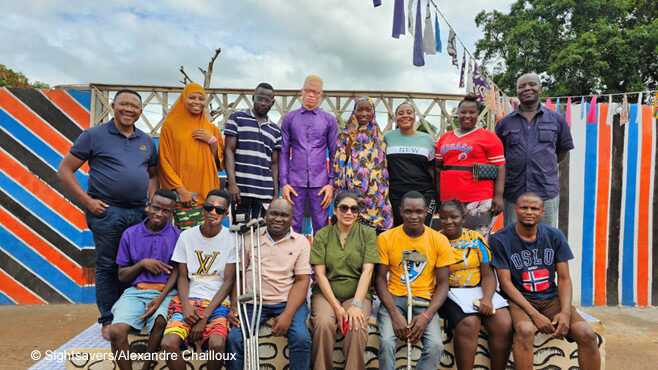
Group photo of youth researchers and members of Sightsavers’ research team involved in a school related gender-based study in Sierra Leone.
Our education and research teams at Sightsavers work closely to inform our practice and programmes. In Sierra Leone we are researching safety in schools and putting the voices of schoolchildren with disabilities at the centre of efforts to combat gender-based violence.
As part of our role in the Data and Research in Education Research Consortium (DARE-RC) in Pakistan, we’re researching disability-inclusive data and systems, including an analysis of the integration of the Washington Group Questions into the Annual School Census in Pakistan. Other work focuses on understanding climate resilience in education.
Our education strategy champions every child’s right to quality education.
The Inclusive Futures education resource hub brings together seven years of research, learning and evidence about what works in delivering inclusive education. The hub includes reports with guidance on finding and enrolling children with disabilities in schools, providing adequate support for teachers, and supporting schools to make the necessary preparations for welcoming children with disabilities. It also hosts webinar recordings, easy read reports, research reviews and case studies.
Some of our key blogs
How can maps help combat violence against children with disabilities?
To achieve quality education for all, disability inclusion is critical
Moving from intention to action is key to inclusive education for all
Exclusion is holding children with disabilities back
Making schools safer for children with disabilities
For more information, please contact:
To find out more about our work, please visit: sightsavers.org/education-for-all, or email Veronica Stapleton, deputy technical director for inclusive education.

